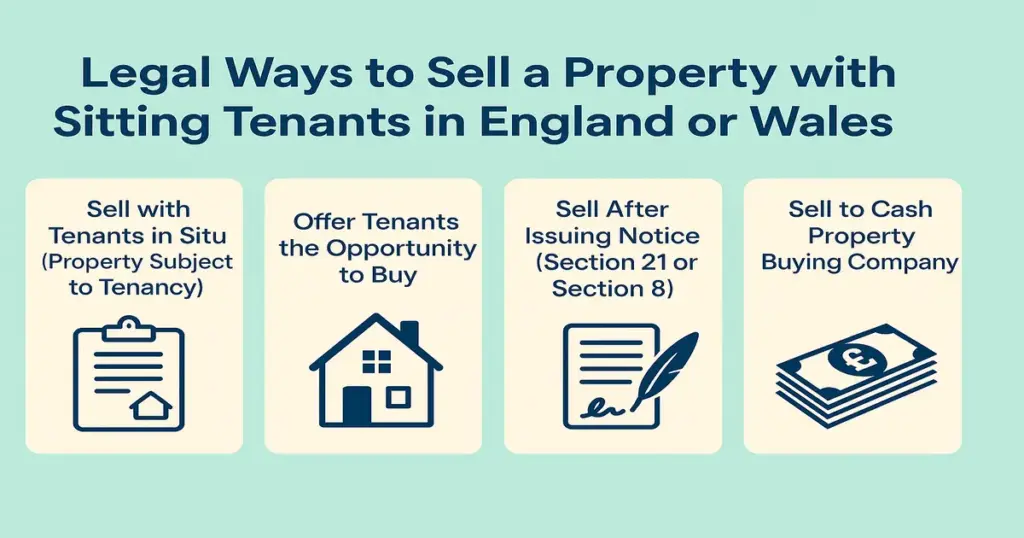Legal Ways to Sell a Property with Sitting Tenants in England or Wales
Selling a property with sitting tenants in England or Wales can be profitable, especially for landlords seeking a smooth exit without eviction.
Whether your tenants are reliable and up-to-date with rent or you’re facing rent arrears, understanding the legal process is essential to avoid potential legal risks and maximise your sale value.
This guide explains all the legal ways to sell a property with sitting tenants in England or Wales, your rights as a landlord, your tenants’ rights, and how to achieve a quick and hassle-free sale without breaching tenancy laws.
What Is a Sitting Tenant?
A sitting tenant is a person who occupies a property under a valid tenancy agreement, usually an Assured Shorthold Tenancy (AST), and continues living there. At the same time, the landlord puts the Property on the market. The tenant has the legal right to remain in the home until the tenancy ends or they are evicted via due legal process.
A property “with sitting tenants” is typically sold subject to tenancy (STT), meaning the new owner inherits the current tenancy agreement and becomes the tenants’ new landlord.
Is It Legal to Sell a Property with Sitting Tenants?
Yes — selling a property in England or Wales with sitting tenants is perfectly legal. The sale must, however, comply with existing tenancy laws, especially the Housing Act 1988. The buyer must accept that the tenants have the right to remain in the Property unless the landlord has obtained possession through a valid Section 8 or Section 21 notice and court order (if applicable).
It’s crucial to:
- Disclose the tenancy status to all prospective buyers.
- Continue fulfilling landlord obligations (repairs, legal notices, etc.).
- Respect tenant rights during viewings and marketing.
Legal Options to Sell a Property with Sitting Tenants
Below are the most common legal methods landlords can use to sell a property with tenants in place:
Sell with Tenants in Situ (Property Subject to Tenancy)
Selling a tenanted property as an investment opportunity is one of the most straightforward options. This is legal, requires no eviction, and appeals to buy-to-let investors.
Key benefits:
- Immediate rental income for the new buyer.
- No costly and time-consuming eviction processes.
- Easier transition for cooperative tenants.
Important legal steps:
- Provide the buyer with a copy of the tenancy agreement.
- Hand over the tenancy deposit scheme details.
- Pass on gas safety, EPC, and electrical safety certificates.
- Ensure compliance with rent payment records and maintenance logs.
Offer Tenants the Opportunity to Buy
You are not legally obliged to offer the tenant first refusal, but doing so can speed up the process and minimise disruption. If they’re interested and financially capable, this creates a win-win situation.
Legal Considerations:
- Ensure the transaction is handled formally via solicitors.
- Provide accurate valuation and mortgage information.
- Ensure the tenant has access to independent legal advice.
Sell After Issuing Notice (Section 21 or Section 8)
Suppose you’re not interested in selling to investors and want a vacant property. In that case, you may legally issue a Section 21 notice (no-fault eviction) or a Section 8 notice (based on breach of contract, such as rent arrears).
Section 21:
- Requires a minimum of 2 months’ notice.
- Only applies after the fixed term ends or if the tenancy is periodic.
- It can’t be used if the deposit wasn’t protected or the prescribed information wasn’t served.
Section 8:
- Used for specific breaches (e.g. rent arrears over 2 months).
- Depending on the grounds, it requires 2 weeks’ to 2 months’ notice.
- A court order is needed for eviction if the tenant doesn’t leave.
⚠️ Warning: Notifying the seller purely to sell the Property may be contested if it is not based on the correct legal grounds or timing.
What Documents Are Legally Required for the Sale?
When selling with sitting tenants, you must provide all relevant documentation:
- Signed tenancy agreement(s)
- Proof of deposit protection (DPS, MyDeposits, or TDS)
- EPC certificate
- Gas Safety Certificate (CP12)
- Electrical Safety Certificate (EICR)
- Rent payment history
- Inventory and condition reports
- Any Section 8 or Section 21 notices (if served)
These documents protect both seller and buyer from future disputes and form part of the due diligence for any property sale.
Legal Rights of Tenants During the Sale
Tenants retain all their legal rights throughout the process. The sale cannot override their tenancy agreement. Here’s what landlords need to respect:
- Quiet Enjoyment: You can’t enter the Property without giving 24 hours’ notice or without permission (except in emergencies).
- Notice of Viewings: You must provide reasonable notice and seek permission, even if your agreement allows for viewings.
- Rent Stability: Tenants must continue paying rent to the current or new landlord, and rates cannot be arbitrarily raised.
- Security of Tenure: AST tenants cannot be removed simply because the Property is for sale.
Can You Sell if the Tenant Refuses Viewings?
Yes — you can still sell the Property, but with added challenges.
If tenants refuse access, you must respect their legal right to quiet enjoyment. Forcing access or constant pressure can amount to harassment — a criminal offence.
Alternatives:
- Negotiate with tenants for specific viewing days/times.
- Offer incentives (e.g. rent discount).
- Consider selling to cash buyers or investor landlords without needing internal viewings.
How Does the Transfer of Tenancy Work?
Once the Property is sold, the new owner becomes the successor landlord, inheriting all legal duties:
- Take over the tenancy agreement as-is.
- Notify tenants of the ownership change in writing.
- Register the tenant deposit in their name (if applicable).
- Continue fulfilling maintenance and legal obligations.
This process is automatic, but good communication helps ensure a smooth transition and avoids legal complications.
Who Buys Properties with Sitting Tenants?
The following buyer types typically look for investment properties with tenants:
- Buy-to-let investors seeking immediate rental income
- Property companies and REITs
- Cash buyers with experience in rental portfolios
- Landlords expanding their portfolios
These buyers often prefer:
- Long-term tenants with a stable payment history
- Reasonable rent-to-value ratios
- Low-maintenance property types (flats or standard family homes)
How to Sell a Tenanted Property Fast – Legal and Safe Strategies
If you’re looking to exit quickly, here’s how to do it without breaking the law:
Sell to a Cash Property Buying Company
Many companies (like us) buy properties with tenants, even those in arrears or under notice. These buyers:
- Don’t require mortgages or surveys
- Accept the legal status of current tenants
- Often complete within 7–28 days
Look for:
- FCA-registered or Property Ombudsman-approved firms
- No fees, commissions, or legal surprises
- Transparent contracts
Work with Lettings-Focused Estate Agents
Some estate agents specialise in landlord-to-landlord sales. They understand tenancy law and market your Property to investors rather than owner-occupiers, ensuring legal compliance and better sales outcomes.
Avoid Emptying the Property Illegally
Never try to evict tenants yourself or “pay them to leave” without a proper agreement. Illegal eviction is a criminal offence with fines and possible imprisonment. Always follow the due legal process.
Pros and Cons of Selling with Sitting Tenants
Advantages:
- Immediate income for buyers
- Avoid costly eviction delays
- Market to a broader pool of investment buyers
- Tenants retain housing stability
Disadvantages:
- Limits your buyer market to investors only
- May sell at slightly below market value
- Delays if buyers want vacant possession
- Viewings may be restricted
Common Pitfalls to Avoid
- Failing to Protect the Deposit: You can’t legally serve a Section 21 notice if the deposit wasn’t registered or prescribed information wasn’t issued.
- Harassing Tenants: Constant calls, unannounced visits, or pressure tactics can lead to criminal charges.
- Selling Without Disclosure: Always inform buyers of the tenancy. Otherwise, you risk legal disputes and failed transactions.
- DIY Legal Work: Always use solicitors familiar with buy-to-let transactions involving tenancies.
Frequently Asked Questions (FAQs)
Can I sell my house with tenants on a fixed-term lease?
Yes, but the new buyer must honour the remaining fixed term of the tenancy. They cannot ask the tenant to leave until the fixed term ends.
Do I have to tell the tenants that I’m selling?
Legally, no — but it’s strongly recommended. Keeping them informed avoids disputes and encourages cooperation with viewings and access.
Can I evict tenants just because I want to sell?
Not directly. You can serve a Section 21 notice if the tenancy is periodic and you’ve complied with all legal requirements. You must follow the correct notice period and obtain a court order if needed.
What happens if the buyer doesn’t want tenants?
First, you must gain vacant possession through mutual agreement with the tenant or legal eviction (Section 21 or 8). Selling with vacant possession typically takes longer.
Will I get less money selling with tenants?
It depends. Tenanted properties may sell slightly below market value unless tenants are reliable and rent is competitive. But you save time, legal costs, and stress compared to gaining vacant possession.
Can I sell to a company that handles problem tenants?
Yes — many cash buyers specialise in properties with problem tenants, rent arrears, or those under eviction notice. These companies often offer fast, all-cash purchases without legal complications.
What legal notice must I give for viewings?
You must give at least 24 hours’ notice and obtain consent. The tenant has the legal right to refuse. It’s best to agree on a schedule that works for both parties.
How fast can I sell a property with tenants?
With the right buyer (especially cash or investment companies), you can sell in 7 to 28 days. Traditional sales may take 3–6 months, depending on the buyer’s funding and due diligence.
Who manages the tenant after the sale?
The new owner becomes the legal landlord, assuming all duties — rent collection, repairs, legal notices, and tenancy renewals.
Do I need a solicitor to sell a tenanted property?
Yes. Use a solicitor experienced in landlord-to-landlord property sales. They will handle the legal transfer of tenancy obligations, ensure compliance, and prevent post-sale disputes.
Final Thoughts: Selling Legally and Stress-Free
Selling a property with sitting tenants in England or Wales is entirely legal and, in many cases, financially savvy—especially if you’re dealing with ongoing rent or property management issues. The key is to comply with all legal obligations fully, communicate clearly with your tenants, and market your Property to the right buyer type.
Whether you sell with tenants in situ or seek vacant possession first, always follow the law, protect your interests, and seek professional advice. If you’re looking for a fast, no-fee solution, specialist property buyers can help you sell quickly, even with problem tenants in place.
Useful External Links
UK Government – Renting Guidance
The official guide is required to be provided to tenants at the start of the tenancy.
Shelter England – Tenant Rights and Selling
Advice for tenants and landlords when a property is put on the market.
Tenancy Deposit Protection (TDP) Schemes
Learn about legal obligations for deposit registration.
Housing Act 1988 – Legislation
Legal foundation for ASTs, Section 8, and Section 21 processes.
Citizens Advice – Selling a Rented Home
Clear tenant guidance if the landlord plans to sell.
The Property Ombudsman (TPO)
Check whether your agent or buyer adheres to recognised codes of practice.
GOV.UK – Section 21 and Section 8 Evictions
Process, forms, and legal timelines for gaining possession.
Read our top Blogs:
Sell My Property Fast For Cash In Wandsworth
What to Do If Your House Won’t Sell: Fast Solutions That Work
How to Sell a House Fast: Proven Tips to Get a Quick Sale Without Estate Agents
📞 Call +447702210159 our friendly team for a same-day offer





